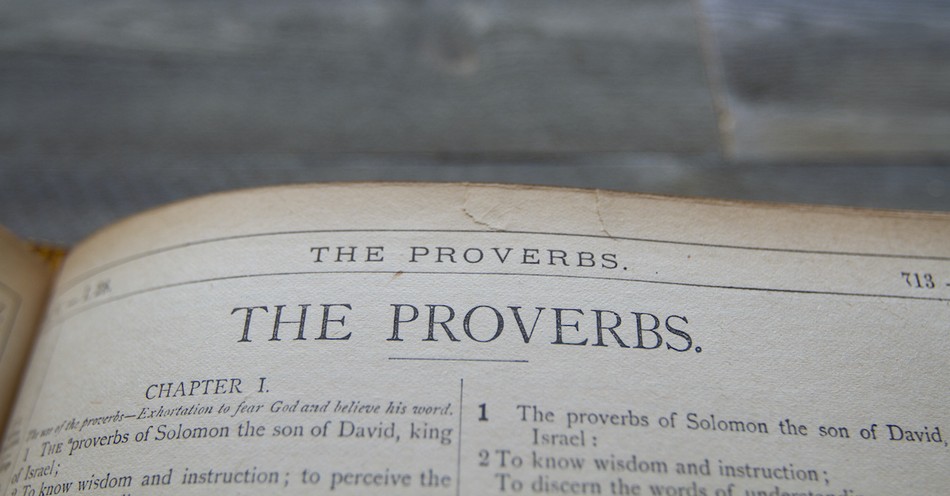The phrase "as a man thinketh in his heart, so is he" from Proverbs 23:7 is often quoted as a stand-alone truth about the power of thought. While this interpretation resonates with modern self-help ideas, the true meaning of this verse is tied to its context, which is part of a warning about dining with a miser or stingy person.
This saying is found within Proverbs 23:6–8, part of a collection of wise sayings from Solomon often referred to as “the sayings of the wise.” These proverbs were compiled to teach wisdom, encourage faith in God, and provide practical guidance for living. Let’s look at the passage in the New King James Version (NKJV): “Do not eat the bread of a miser, nor desire his delicacies; for as he thinks in his heart, so is he. ‘Eat and drink!’ he says to you, but his heart is not with you. The morsel you have eaten, you will vomit up, and waste your pleasant words.”
Understanding the Context
This particular saying warns against accepting the hospitality of a stingy or begrudging host. While the host may say, “Eat and drink,” his heart is not in it. The phrase “as he thinks in his heart, so is he” refers to the miser’s inward calculations. He may outwardly appear generous, but internally, he’s counting the cost of every bite and resenting your presence. The verse highlights a disconnect between his outward actions and inner thoughts.
Modern translations make this meaning clearer. The English Standard Version (ESV) translates it as:
“Do not eat the bread of a man who is stingy; do not desire his delicacies, for he is like one who is inwardly calculating. ‘Eat and drink!’ he says to you, but his heart is not with you.”
The Hebrew word translated as "thinketh" in the King James Version more accurately means "calculates" or "estimates." The miser’s thoughts revolve around what your meal is costing him, not about genuine hospitality or fellowship. When you realize his true attitude, the food that once seemed appealing will leave you feeling disgusted and your kind words wasted.
Meaning of 'As Man Thinks, So Is He'
This expression means that what someone says or does is not necessarily what they think in their heart. People may be courteous or polite but have contentious thoughts and sentiments. Ultimately, what "a man thinks in his heart, so is he." The book of Proverbs is known for such concise wisdom. People ruled by sin are influenced by the chief deceiver, Satan, and become deceivers themselves.
Understanding is one of the general virtues of Wisdom. He who has this virtue understands true life. A false life is the love of riches and gourmet dining (Proverbs 23:3). Poor people should never measure themselves to materially rich people. A false life is one of deception.
The source of instruction is Wisdom, who is Christ, our Teacher. If one gives his spiritual heart and ears to Him, he will be instructed by Him with words of perception, the crown of the virtues. To see, or perceive, life and ourselves as we truly are is essential to genuine repentance and seeking of God. The deluded man is blind to his own sins.
Different Interpretations
The Septuagint, the ancient Greek translation of the Old Testament, takes a slightly different approach. It warns against dining with an envious person, comparing the experience to swallowing a hair in one’s throat—uncomfortable and likely to provoke a gag reflex. Whether referring to a stingy miser or an envious man, the general wisdom is clear: Be careful about whose hospitality you accept, as it may come with strings attached or leave you feeling sickened by their insincerity.
Bible Commentary on Proverbs 23
Eat thou not the bread of him that hath an evil eye, neither desire thou his dainty meats: 7 For as he thinketh in his heart, so is he: Eat and drink, saith he to thee; but his heart is not with thee. 8 The morsel which thou hast eaten shalt thou vomit up, and lose thy sweet words. (Proverbs 23:6-8)
Those that are voluptuous and given to appetite (v. 2) are glad to be where there is good cheer stirring, and those that are covetous and saving, that they may spare at home, will be glad to get dinner at another man's table. Therefore both are here advised not to be forward to accept of every man's invitation, but especially not to thrust themselves in uninvited.
Observe, 1. Some pretend to bid their friends welcome that are not hearty and sincere. They have a fair tongue and know what they should say: Eat and drink, saith he, because it is expected that the master of the feast should so compliment his guests; but they have an evil eye and grudge their guests every bit they eat, especially if they eat freely. They would seem to be liberal in making the entertainment and would have the credit for it, but they have so great a love for their money and so little for their friends that they cannot have the comfort of it, nor any enjoyment of themselves or their friends. The miser's feast is his penance. If a man is so very selfish, sordid, and mean that he cannot find in his heart to bid his friends welcome to what he has, he ought not to add to that the guilt of dissimulation by inviting them, but let him own himself to be what he is, that the vile person may not be called liberal nor the churl bountiful, Isaiah 32:5.
2. One cannot be comfortable accepting the entertainments given grudgingly: "Eat not thou the bread of such a man; let him keep it to himself. Do not sponge upon those that are bountiful, nor make thyself burdensome to any, but especially scorn to be beholden to those that are paltry and not sincere. Better have a dinner of herbs, and true welcome, than dainty meats without it.
Therefore," (1.) "Judge of the man as his mind is. Thou thinkest to pay thy respect to him as a friend, so thou takest him to be because he compliments thee, but as he thinks in his heart, so is he, not as he speaks with his tongue." We are that really, both to God and man, which we are inward, and neither religion nor friendship is worth anything further than as it is sincere.
(2.) "Judge of the meat as the digestion is and as it agrees with thee. He bids thee eat freely, but, first or last, he will discover his sordid covetous humor, and as he thinks in his heart so will he look, and give thee to understand that thou art not welcome, and then the morsel thou hast has eaten thou shalt vomit up; the very thought of that will make thee even to vomit the meat thou hast eaten, and eat the words thou has spoken in returning his compliments and giving him thanks for his civilities. Thou shalt lose thy sweet words, which he has given thee and thou has given him." (Excerpt from Matthew Henry)
What This Teaches Us
While this verse doesn’t directly address the modern idea of “you are what you think,” it does emphasize the importance of one’s inner thoughts and motivations. A person’s true nature is revealed not by their words but by what is in their heart. For the miser, generosity is a façade masking a calculating and self-centered spirit.
The broader lesson for us is to be discerning in our relationships and interactions. True fellowship and hospitality come from a place of sincerity, not pretense. Whether the warning is about stinginess, envy, or selfishness, the message is timeless: seek relationships rooted in genuine care and integrity, and be cautious of those whose outward actions don’t align with their inward thoughts. Solomon’s wisdom challenges us to consider not just what people say but the heart behind their actions, reminding us that authenticity matters in all aspects of life.
Photo credit: Sparrowstock
Christianity.com's editorial staff is a team of writers with a background in the Christian faith and writing experience. We work to create relevant, inspiring content for our audience and update timely articles as necessary.



